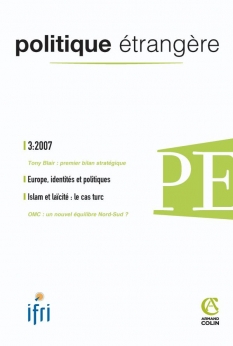
Politique étrangère n° 3/2007
Pour acheter ce numéro, contactez-nous
Recevez les numéros de l'année en cours et accédez à l'intégralité des articles en ligne.
L’Alliance demeure centrale dans les perceptions stratégiques de l’élite américaine. Les partenariats qui pourraient élargir son champ d’influence sont souvent vus comme nécessaires, même si leur étendue reste discutée. Quant à la PESD, elle n’effraie pas vraiment outre-Atlantique, dans la mesure où elle ne conduit pas l’Europe à se détourner de l’Alliance. Mais c’est à l’aune du conflit en Afghanistan, et de l’engagement des Européens dans ce pays, que les Américains jugeront du futur de l’OTAN.
Many U.S. elites hope a transformed NATO will become the main political military institution of the 21st Century. There is no certainty that it will, however. Changes are in the air and a growing number of analysts in Washington feel that the future of the alliance is in European hands. On the one hand, the pressures due to wars in Iraq and Afghanistan are encouraging many U.S. policymakers to view the ESDP as a potential future asset to NATO. As a result, the United States is likely to grow more open to the development of ESDP. On the other hand, if the alliance fails in Afghanistan, defeat is likely to be blamed, fairly or not, on the timidity of European capitals. In this case, U.S. support for ESDP will falter, and the U.S. could lose interest in NATO altogether.